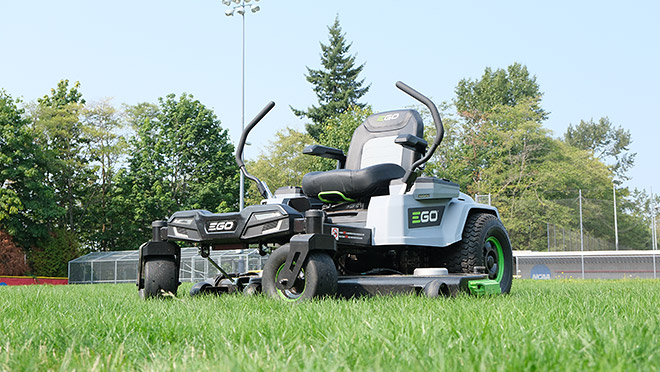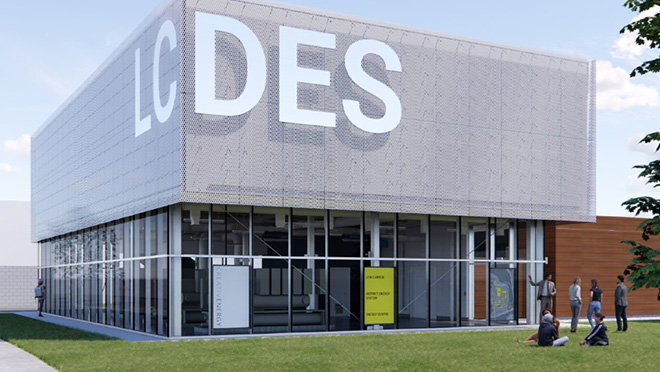Landscaper trims gas use by betting on electric tools

Clean Energy Champion is shifting to cleaner and quieter
Part of a series on BC Hydro Clean Energy Champions: businesses, homes, and institutions – large and small – recognized for reducing their reliance on fossil fuels.
Steve Robertson doesn't pretend that the landscaping company his dad founded has gone all in on the fight against climate change. But on an increasing number of its job sites, Surrey-based Premier Landscaping is swapping out gas-powered equipment for tools that run on clean electricity.
In adopting electric tools for jobs big and small, the company is an innovative outlier. Where most commercial landscapers see electric lawnmowers, trimmers, and blowers as too costly and/or not up to the demands of the job, Premier is betting that getting ahead of the adoption curve will pay off.
"We can see that eventually the industry is going to move that way," says Robertson, director of sales and marketing for the company. "It may take a long time, but we'd rather be knowledgeable about it, and become an authority on it before it catches us off guard."
There are already some local bans on gas-powered leaf blowers in Canada. And two municipalities in Marin County, California, are phasing in a ban on the use of other gas-powered equipment as well, including mowers.
But that's just one of the three reasons Premier Landscaping – recently recognized as a Clean Energy Champion – is going electric.
"The second part is that it makes sense for us as part of our initiative to reduce chemical usage," says Robertson. "If we're trying not to pump chemicals into the ground, why should we pump exhaust into the air?"
It's the third reason, cost-effectiveness, that may take other landscapers by surprise. While he's careful to say these are early days, and that the math is hardly conclusive, the cost savings on using clean electricity over gas are looking promising.
"Electric equipment is a lot cheaper to charge, and there's a lot less maintenance with no oil changes," he says, adding as a word of caution: "We're not totally confident yet on the savings. We don't know how well the equipment will hold up, but we're working with manufacturers to make it work."
Making the case with EVs, trimmers and a ride-on mower
One of the first fuel-switching moves Premier Landscaping made was adding Tesla Model 3s to their company fleet. As a large landscaping company with clients at 150 sites in the Lower Mainland, and 30 crews working those sites, Premier uses a pair of Teslas and a Ford Fusion Hybrid for the company's estimators, who are "on the road all the time", according to Robertson.
What makes Premier different, however, is that they've been testing everything from huge electric mowers, to a suite of Stihl electric blowers, hedge trimmers, and smaller 21-inch mowers. The big stuff is used for larger clients including two Burnaby post-secondary institutions: Simon Fraser University (SFU) and the B.C. Institute of Technology (BCIT). The smaller equipment is used for a number of strata apartment clients who want quieter, cleaner equipment on site, and/or who are willing to pay a little extra for landscaping that produces fewer CO2 emissions.
At sites such as SFU where a work yard can be set up to include charging, the electric mower starts to become cost-effective.
"With the modelling we've done, we're saving about $10,000 a year on fuel, oil, and maintenance that is required for gas-powered mowers," he says. "Not every landscaper is going to get that savings. We're looking at a mower that's being used continuously for eight hours. And a lot of landscapers, especially the smaller ones, might use a mower for an hour, put in on the trailer, drive half an hour to the next site, and use it for another hour. So they're not going to have the same cost savings."
And electric mowers are quieter. Robertson says his staff is still required to wear hearing protection when using the EGO mower, but CNET reports that even in smaller mowers the volume for an electric mower is up to about 70 decibels (about the same as a vacuum or clothes washer). That compares to the gas mower's 95 db, which is more than four times as loud as 70 db, and akin to the noise made by a motorcycle.
Is all-electric landscaping coming to your neighbourhood?
There's a big gap between homeowner adoption of electric landscaping tools and the commercial landscaper adoption rate. A recent study by California State University at Fullerton found that while homeowners have gone 50% electric, only 6% of the equipment used by professional landscapers was electric.
But electrics are coming to your neighbourhood, and Premier Landscaping is helping make that happen.
"We have one crew that's fully electric on some stratas," he says, referring to apartment/condo clients. "It's generally only useful for smaller sites, where the crew is moving between sites and charging their equipment when they're not using it. We're even using electric backpack blowers, and they're fantastic."
Robertson says that with more people working at home in the wake of the COVID-19 pandemic, there are increasing calls for quieter and cleaner equipment that doesn't give off gas fumes.
And what do his crews think of the electric equipment? Overall, a lot of them have been fairly receptive. It just takes a bit of education to realize that using this type of equipment is a benefit to us, and to the environment.


